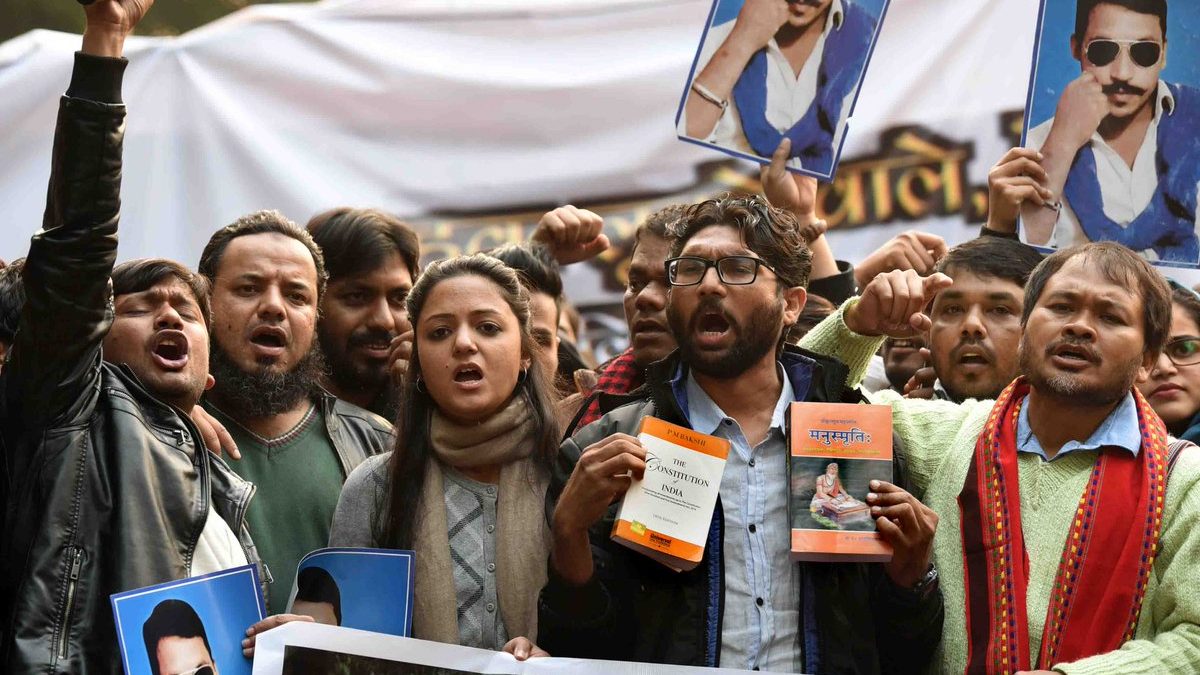
A journalist, activist lawyer, and an MLA in the Gujarat Legislative Assembly, Jignesh Mevani has switched between his roles with relative ease, all along maintaining the spirit and soul of an activist fighting for justice for the Dalits and the marginalized.
Often considered a part of a new emergent left-wing in India, Jignesh Mevani, convener of the Rashtriya Dalit Adhikar Manch (RDAM), identifies himself as a social liberal. He subscribes to the Ambedkarite school of thought according to which social transformation is achievable by forging a class unity among all marginalized groups. He believes that if we cannot build a classless society in India, we can at least build a society where the gap between the rich and the poor is narrower and economic exploitation is lesser.
Family and personal life
Jignesh Mevani was born on 11 December 1980 in Ahmedabad to a family of Dalits in Mehsana district, Gujarat. His upbringing was in a lower-middle-class family in a Dalit populated locality of Meghaninagar. Both his parents were humble government clerks - his father worked at the Ahmedabad Municipal Corporation and his mother at the Bharat Sanchar Nigam Limited (BSNL).
He is unmarried and devotes all his time to fighting against social injustice against the Dalits and the fascist agenda of the Rashtriya Swayamsevak Sangh (RSS), its Sangh Parivar affiliates, and the Bharatiya Janata Party (BJP).
Education and early career
Jignesh Mevani graduated in 2003 with a Bachelor of Arts in English literature from the HK Arts College, affiliated to the Gujarat University. It was in college that he was introduced to various historical and contemporary figures of social activism in Gujarat and civil society literature through his professors Saumya Joshi and Sanjay Bhave. During this time, he performed in parallel cinema and researched the works of the Gujarati language poet, Mareez. He also became heavily influenced by the Dutch painter Vincent van Gogh and the human rights activist Mukul Sinha.
Upon completing his graduation, he enrolled for a postgraduate diploma in journalism and mass communication at Bhavan's College, Ahmedabad, which he received in 2004. In the same year, Mevani shifted to Mumbai and took up a job with a Gujarati language news magazine called Abhiyaan, as a journalist.
After working as a journalist for 3 years, he realized that idealism and realism were two very different things. He quit journalism to pursue activism full-time after watching the Gujarati documentary on farmers' suicides called Khedu Mora Re. He drew his last salary of ₹15,000 in August 2007 and thereafter relied on a few friends to provide him with ₹1,000-1,500 for his monthly expenses while working as a full-time activist.
Over the course of his activist life, he felt compelled to pursue a degree in law to help poor Dalits in need of legal representation. He enrolled in the DT Law College and graduated for a second time with a Bachelor of Law (LLB) degree in 2013 and became a practicing activist lawyer at the Gujarat High Court.
Journey into politics via activism
Jignesh Mevani returned to Gujarat in 2008 and started working with RTI activist Bharatsinh Zala along with whom he visited several places to study the causes and issues leading to farmers' suicides. Later, he joined Jan Sangharsh Manch (JSM), the civil rights organization run by Mukul Sinha, that worked to combat issues of discrimination against Dalits. Thereafter, he developed associations with many other like-minded activists such as Manjula Pradeep (Navsarjan Trust), Martin Macwan (Dalit Shakti Kendra), Girish Patel, and Chunilal Vaidya and fought for various social issues like farmers' rights, land reform, and the development of sustainable rural economies.
Some of the notable highlights of Jignesh Mevani’s activist life are:
- In 2015, he initiated a public interest litigation (PIL) at the High Court for the allocation of 56,873 acres of surplus government land to landless laborers in Gujarat.

- The Una flogging incident brought Jignesh Mevani into the national limelight. On 11 July 2016, seven Dalit youths were tortured in the town of Una, Gujarat on the pretext of cow protection and in the presence of the local police. The assailants filmed the incident and shared it over social media. The incident culminated in a mass movement and large-scale militancy among Dalits in the state. Around 30 Dalit rights organizations combined to form the Una Dalit Atyachar Ladat Samiti (UDALS) and its committee announced a mass demonstration and assembly against caste-based atrocities and discrimination in Ahmedabad on 30 July 2016. Jignesh Mevani was appointed as the convener of the committee and one of the key organizers of the event at which he gave a rousing speech to approximately 20,000 people consisting of ragpickers, scavengers, tanners, and landless farm laborers. The attendees included Dalits and non-Dalits such as upper caste liberals, human rights activists, Muslims, and other backward castes (OBCs). The hugely successful movement further led to taking out a Swabhimaan Yatra (dignity march) on foot from Ahmedabad to Una, covering 380 km. The march was also referred to as the Dalit Asmita Yatra (Dalit Self Respect Journey), the Azaadi Kooch (Search for Freedom), or the #Chalo Una (Let's go to Una!) march. These became one of the largest demonstrations for the cause of Dalits in the recent history of Gujarat, making Jignesh Mevani a prominent voice of Dalits.
- Jignesh Mevani is a huge proponent of land reform in India and allotment of 5 acres of land to landless farmers has been one of his long-standing demands. He believes that "one cannot preach self-respect to empty stomachs" and that land reform is a vital tool to bring important structural changes in the society for caste-based annihilation. As a result, Jignesh Mevani along with several of his friends founded the Rashtriya Dalit Adhikar Manch (RDAM) to extend their agitation for land rights to a national scale. Upon forming this front, he resigned from his membership with the Aam Aadmi Party to keep the protests "untainted by political affiliations". As of December 2016, their agitations and negotiations with the government led to the distribution of plots of land to around 200 Dalit families.
- In January 2017, Mevani joined the agitations of the Kachra Vahtuk Shramik Sangh (Garbage Collection Workers' Association) in Mumbai to protest the unfair wages. He encouraged the workers to go on strike if necessary and in a swipe at the ministers and Bollywood stars who had promoted themselves through the Swachh Bharat Abhiyan, asked them to clean the city themselves.
Jignesh Mevani made a formal entry into active politics and successfully contested the 2017 Gujarat Assembly elections and became a member of Gujarat’s Legislative Assembly (MLA).
Key highlights of political life
- Jignesh Mevani joined the Aam Aadmi Party in 2014 and became its Gujarat spokesperson, a position he resigned from in 2016 to keep his protests apolitical.
- Jignesh Mevani’s campaign for the 2017 Gujarat Assembly elections received over ₹20 lakhs through crowdfunding. The election was primarily a two-sided battle between BJP and RDAM which political observers compared to a David vs Goliath fight. Despite BJP’s vitriolic election campaign and active political campaigning by the PM Narendra Modi, party president Amit Shah, and UP CM Yogi Adityanath, Jignesh Mevani won the election with a margin of over 18,000 votes securing 50.8% of total votes polled.

- In January 2018, Jignesh Mevani led the call for Yuva Hunkar rally at Delhi's Jantar Mantar to protest against the arrest of Chandrasekhar Azad, a Dalit leader arrested in June 2017 over the caste clashes in Saharanpur, and to demand employment for the Dalits. Over 1500 paramilitary forces were deployed with water canons as Delhi police claimed the organizers did not have permission to hold the rally. The rally was eventually held at Parliament street in which many youth leaders participated calling for an end to corruption, unemployment, and the oppressive policies of the BJP government.
- In December 2019, Mevani opposed the Statue of Unity Area Development and Tourism Governance Bill on the grounds that it would adversely affect the local tribals from 70 villages who were displaced when the government forcefully snatched their lands for the construction of the Sardar Vallabhbhai Patel’s statue. The Bill created a governance authority that empowered officials to take punitive action against engaging in activities that would harm the "tourism potential" of the site, including begging, hawking, and unauthorized development. He was suspended for 3 days on grounds of indiscipline after alleging that the Treasury benches followed the Manusmriti and not the Constitution of India.
- In April 2021, Jignesh Mevani opposed the Gujarat education department’s move to conduct offline secondary and higher secondary boards examination risking student’s lives despite the Central Board of Secondary Education (CBSE) having canceled offline examinations.
- In Sep 2021, he pledged support to the Indian National Congress though he couldn’t join the party formally due to a technical constraint arising from him being an independent MLA. He maintained his belief in India’s grand old party to help in stitching together a coalition of anti-fascist, anti-BJP forces and committed to fighting the 2022 Gujarat Assembly elections under Congress.
Jignesh Mevani on Twitter
TO READ THE FULL ARTICLE

Get full access to the exciting content on The Mirrority by logging in
Support independent journalism
Even the very best of media houses in our country today are yielding to the pressure of click-bait journalism in order to survive. More than ever before, our country needs journalism that is independent, fair and non-pliant to the bureaucracy. Such journalism needs the support of like-minded readers like you to help us survive editorially and financially.
Whether you live in India or India lives inside you, help us continue to produce quality journalism with your contribution.
CONTRIBUTE
